They say that what you focus, on grows. So, if you want to speak Cantonese like a pro, start learning the basic words and phrases in Cantonese, such as 你好. (nei5 hou2.) Learning the basics is vital for your success in learning languages, not just Cantonese. Part of the basics that you want to know is knowing about the Cantonese language. Do not worry; we will not trace it down from the very beginning. We’re just going to know what Cantonese is and where it is spoken.
Cantonese is one of the Chinese languages, together with Mandarin. It is called Traditional Chinese. Cantonese is spoken in Hong Kong, Macau, and Guangdong Province in Mainland China. If you are not a native speaker, it will be hard for you to determine Mandarin and Cantonese, but if you want to know their differences, there is a separate blog that you can read.
Now that you have learned a little bit about the Cantonese language, let us start learning some basic words and phrases in Cantonese.
Learn The Basic Words And Phrases In Cantonese
The Cantonese language is spoken by 88.9% of Hong Kong’s population. Many locals know how to speak English, but can you imagine yourself visiting Hong Kong without learning any basic words and phrases in Cantonese? Can you imagine yourself not being able to connect with the locals using the language that they love? Well, it could be something that you’ll regret if you do not do so.
There can be many advantages if you start learning Cantonese. You can use it in making directions, greeting someone, shopping, and traveling. You can also use it for personal use even if you do not go to Hong Kong. It can be used to level up your greetings and self-introduction. So, here are some basic words and phrases in Cantonese:
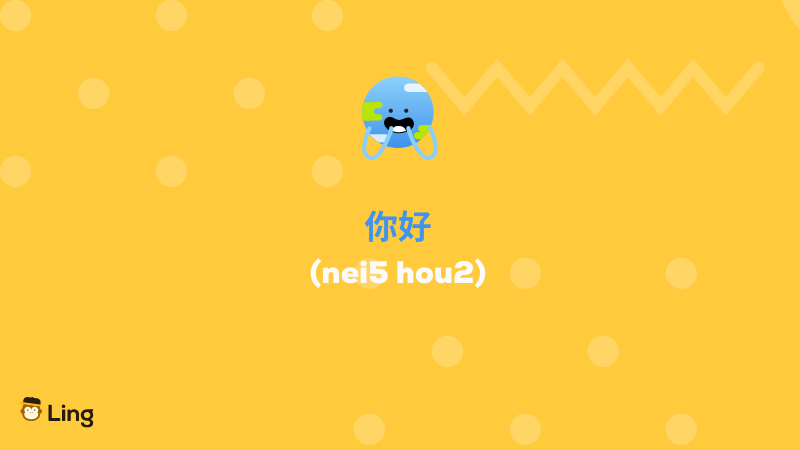
1. 你好. (nei5 hou2.) / 嗨。(hei1)
English Translation: Hello / Hi
Greetings are polite ways to open conversations. Even how simple it is, it will really mark the other person’s impression of you. There are two ways to say hello in Cantonese. The formal way is 你好. (nei5 hou2.) which translates to “Hello” in English. The less formal way is 嗨。(hei1), which translates to “Hi” in English.
Just a quick tip. Always be respectful to the one you are talking to. Whether they are local or foreigners, give them pleasant greetings that will make them smile upon starting the conversation. There are other greetings in Cantonese that you can say aside from Hello 你好. (nei5 hou2.) and 嗨。(hei1) but, this word is enough to learn the basics.
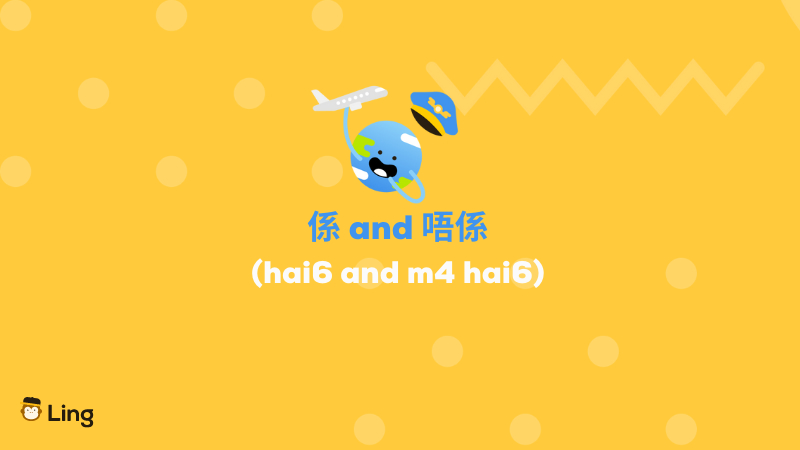
2. 係。(hai6) And 唔係。(m4 hai6.)
English Translation: Yes and No
Knowing the basic way how to agree and disagree is a must. This is one of the most commonly used words in our daily lives. Of course, you may use non-verbal communication, such as nodding and giving thumbs up. But, it would be best if you still learned how to say Yes and No in Cantonese, especially when you have to answer in written form. Learning how to say Yes 係。(hai6) and No 唔係。 (m4 hai6.) in Cantonese is essential in most situations. It can answer many basic questions like:
你識講英文嗎?(nei5 sik1 gong2 jing1 man6 maa3?) – Do you speak English?
食咗飯未呀?(sik6 zo2 faan6 mei6 aa3?) – Have you eaten yet?
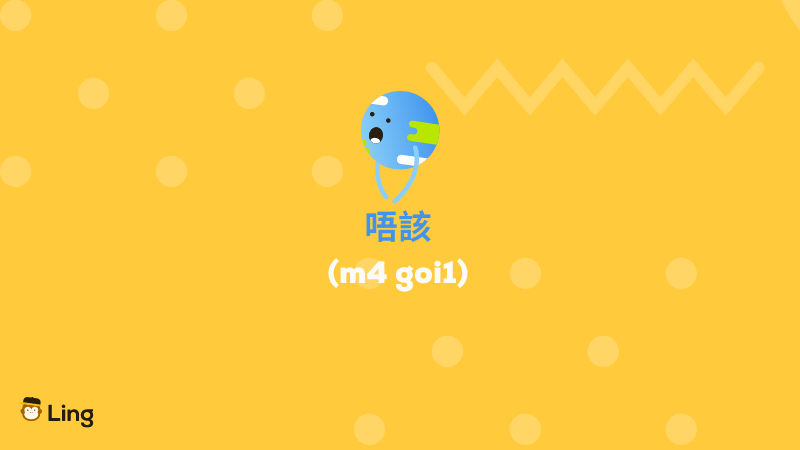
3. 唔該。(m4 goi1.)
English Translation: Please.
Being polite 有禮 (jau5 lai5 maau6) polite can go a long way. This is really important to avoid misunderstandings. This is true in most cultures in the world. Being polite 有禮 (jau5 lai5 maau6) is a way of showing respect 尊重 (zyun1 zung6) respect to other people, including their country and their culture. Although there are many ways to show respect in the Cantonese language, you may start with Please 唔該。(m4 goi1.).
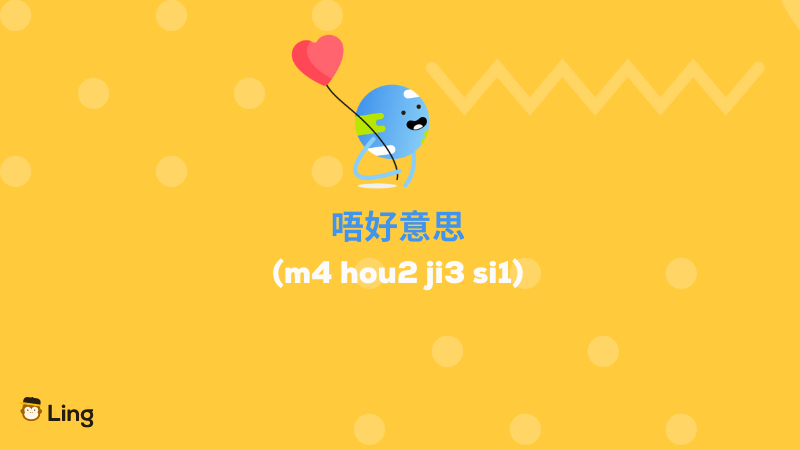
4. 唔好意思。(m4 hou2 ji3 si1.)
English Translation: Excuse me.
Another way of showing respect and politeness is the using the word 唔好意思。 (m4 hou2 ji3 si1.). It can be used in situations like getting someone’s attention and getting past someone.
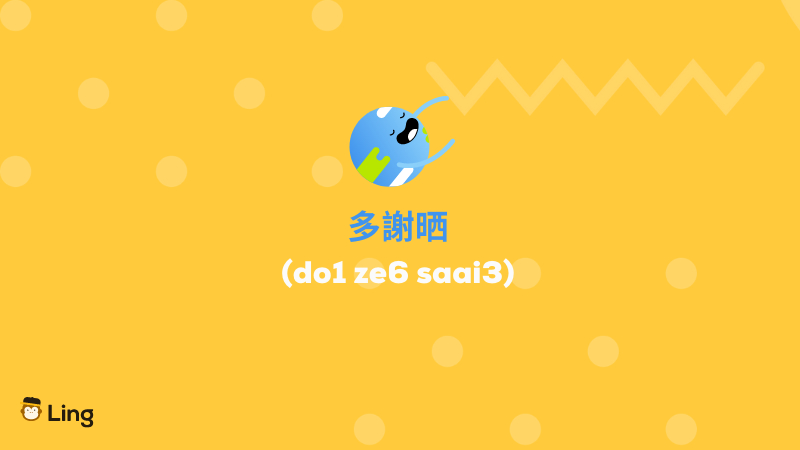
5. 多謝。(do1 ze6.) / 多謝晒。(do1 ze6 saai3)
English Translation: Thank you! / Thank you very much
Showing gratitude is one of the most important things in this world. If you are in another country like Hong Kong, you should know how to say Thank you 多謝。(do1 ze6.). Do not forget to say Thank you if someone does you a favor or does services for you, like the waiter when you’re ordering food in your favorite Chinese restaurant, a taxi driver when traveling, or even just a random stranger when you are asking for directions when you are lost. If you are feeling extra grateful, you can say 多謝晒。(do1 ze6 saai3). Of course, it would not hurt you to be friendly and kind.
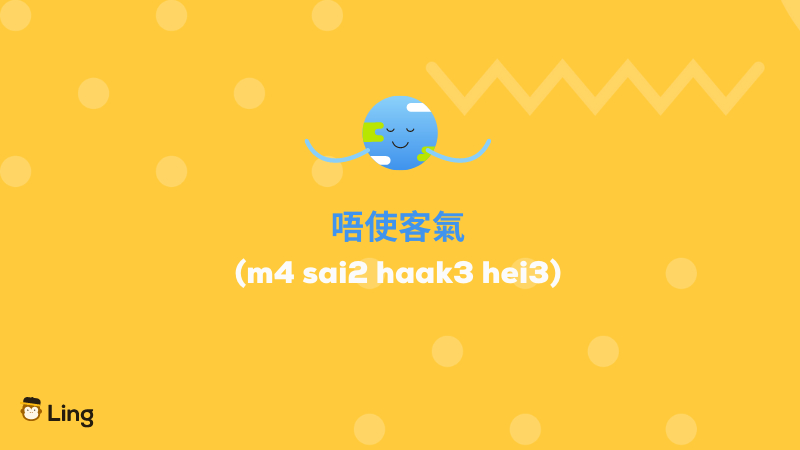
6. 唔使客氣。(m4 sai2 haak3 hei3.)
English Translation: You’re welcome.
If you know how to say Thank You in Cantonese 多謝。(do1 ze6.), you should also learn how to respond. To do that, you can say 唔使客氣。(m4 sai2 haak3 hei3.). Remember, it is always better to be polite, and responding is one of the basic ways to do that.
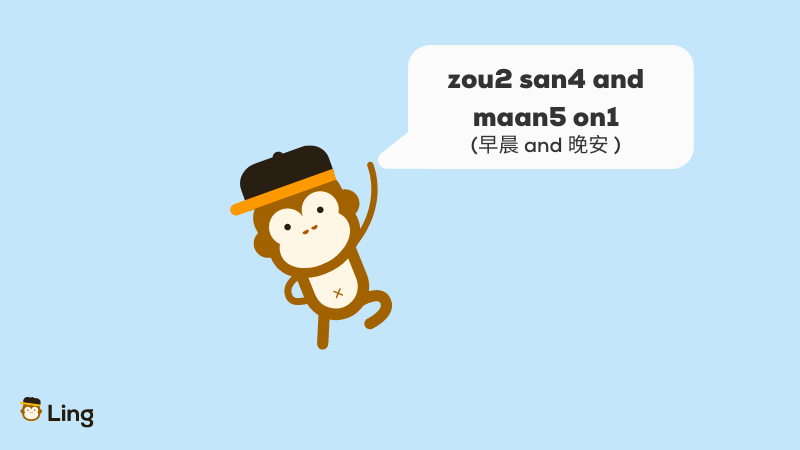
7. 早晨。 (zou2 san4.) And 晚安。(maan5 on1.)
English Translation: Good Morning and Good evening.
Part of the conversations are greetings at different times of the day. It is essential in a formal conversation. Good Morning 早晨。 (zou2 san4.) and Good night 晚安。(maan5 on1.) is one of the most commonly used greetings. If you want to know more about greetings at different times, like Goodnight, Goodbye, and Good afternoon, there is a separate blog for you.
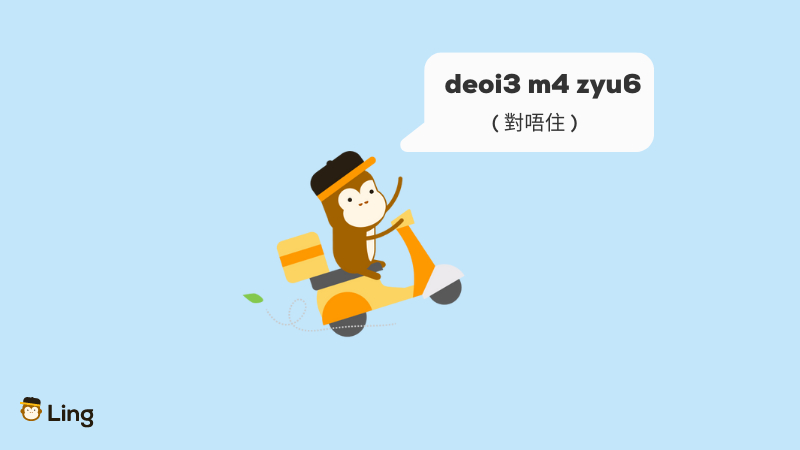
8. 對唔住。(deoi3 m4 zyu6.)
English Translation: I’m sorry.
Being able to acknowledge your mistake shows humility. If you are not familiar with a country’s culture, there is a huge chance that you might offend someone. This is why apologizing is one of the basic words and phrases in Cantonese that you need to learn. If there are incidents that you did something wrong, no matter how small it is, make sure to say sorry 對唔住。(deoi3 m4 zyu6.).
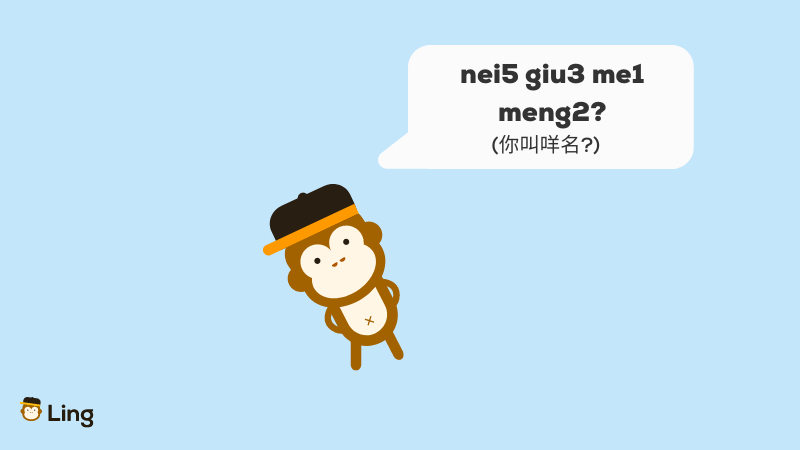
9. 你可唔可以幫我?(nei5 ho2 m4 ho2 ji5 bong1 ngo5)
English Translation: Can you help me?
Being a foreigner in a country could be challenging. So you will be asking for a favor and help from other people—Hong Kongers and really welcoming and kind-hearted. Do not hesitate to ask for help using the phrase 你可唔可以幫我?(nei5 ho2 m4 ho2 ji5 bong1 ngo5).

10. 你叫咩名? (nei5 giu3 me1 meng2?)
English Translation: What’s your name?
One of the important basic words and phrases that you need to know is 你叫咩名? (nei5 giu3 me1 meng2?). This will be helpful when you are asked to introduce yourself. When you are traveling, it is not impossible to meet new people. If you want to make stronger connections and new friends in Hong Kong, you can use 你叫咩名? (nei5 giu3 me1 meng2?).
In case you need to introduce yourself, the easiest way to do that is using the word 我係… ngo5 hai6… which means “I’m (name).” in English.
Other Cantonese Phrases That You Might Need To Know
Now that you have learned the 10 basic words and phrases in Cantonese that you need to know, here are more words and phrases that you can practice pronouncing. Remember, Chinese characters and pronunciation can be challenging and hard to understand at first if you are not familiar with the Chinese writing system. So, if you want to learn Cantonese effectively, you have to keep on practicing and start with these phrases:
| English Translation | Cantonese | Pinyin |
|---|---|---|
| Congratulations! | 恭喜。 | gung1 hei2. |
| Where are you from? | 你邊度嚟㗎 | nei5 bin1 dou6 lei4 gaa3? |
| Where is the bathroom? | 廁所喺邊? | ci3 so2 hai2 bin1? |
| Nice to meet you. | 好開心識到你。 | hou2 hoi1 sam1 sik1 dou2 nei5. |
| I’m fine. | 我好好。 | ngo5 hou2 hou2 |
| May I sit here? | 我可唔可以坐呢度? | ngo5 ho2 m4 ho2 ji5 co2 ni1 dou6? |
| Check, please. | 唔該,埋單。 | m4 goi1 maai4 daan1. |
Going To Hong Kong? I Have Some Tips About Ling For You!
From beautiful skyscrapers down to delicious Cantonese food, Hong Kong is undoubtedly one of the most beautiful places in the world that you can visit. But, Hong Kong is not just about the beautiful sites and food. Hong Kong has its own gems, which are its language and people.
So, if you want to travel and discover more about Hong Kong, you should learn more Cantonese words and phrases like Useful Cantonese Vocabulary About Transportation. This will widen your Cantonese vocabulary and will help you know more about their culture and country even more.
But, if you want to go extra, why not level up your language learning experience using the Ling app? If you want to learn Cantonese in an engaging, exciting, and meaningful way, the Ling app will provide you with that experience. Learning through this app is like a game.
You can level up and gain mastery while you are having fun for free. You don’t have to worry about expensive language learning lessons, books, and schedules because of the Ling app. You can learn Cantonese and other languages at your own pace.
Learn more than the basic words and phrases in Cantonese. Turn your language learning experience to the next level. Start learning Cantonese by downloading the app on the Play Store or App Store now!
















